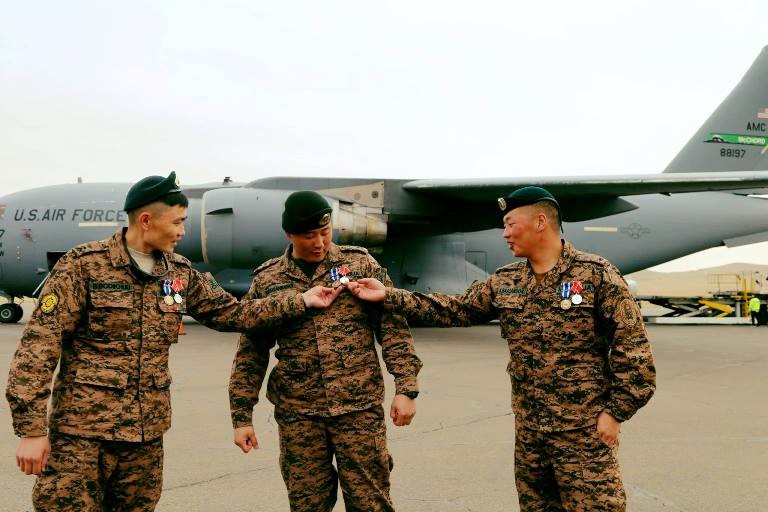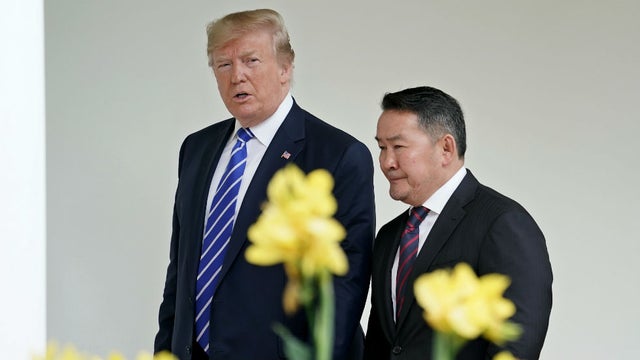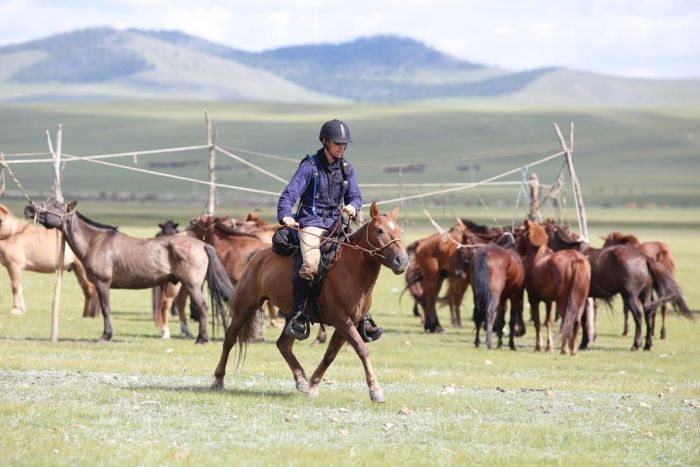Events
| Name | organizer | Where |
|---|---|---|
| MBCC “Doing Business with Mongolia seminar and Christmas Receptiom” Dec 10. 2025 London UK | MBCCI | London UK Goodman LLC |
NEWS

US, Mongolia Share Airfield, Emergency Medical Expertise www.pacom.mil
ULAANBAATAR, MONGOLIA -- The United States and Mongolian military leaders conducted airfield and emergency medical subject-matter expert exchanges to share cultural expertise, technical competency and vital training with Mongolian participants in Ulaanbaatar, Mongolia, July 22-26, 2019.
The air advisor and medical response exchanges were part of Pacific Angel (PAC ANGEL) 19-3, and combined humanitarian assistance engagement incorporating subject matter expert exchanges with medical outreach and civic engineering projects, led by U.S. Pacific Air Forces.
U.S. Air Force air advisors and Mongolian Air Force officers shared experiences and knowledge on an array of operational topics, to include humanitarian aid and disaster response procedures that incorporate the use of MI-17 helicopters, a transport helicopter often used by the Mongolian air force. Discussion topics also included runway and airfield maintenance, airspace classifications, ground-to-air signaling and flight notification procedures.
Lt. Col. D. Shatarragchaa, Mongolian air force State Division Department commander, coordinated and oversaw much of the exchange. He specifically noted some of the most valuable information the Mongolian officers gained from the week included learning to identify and select landing zones, and gaining more search and rescue methodology.
U.S. Air Force Master Sgt. Mark Hoover, 36th Contingency Response Support Squadron air advisor, explained U.S. Pacific Air Forces maintains contingency response forces ready to respond to emergency humanitarian assistance or disaster relief, "Air advisors go to our partner nations and we perform these exchanges and build partnerships, so when something like that happens, we already have those relationships established."
Simultaneously, in Bayongol Soum, Mongolia, community doctors, nurses and civilian volunteers took part in a trauma and mass casualty response training exercise.
Mongolian Armed Forces and U.S. Air Force medical personnel equipped the participants with vital knowledge and experience for first responders, ending the week with hands-on exercises to employ procedures learned throughout the week.
Initial injury assessment, burn treatment and tourniquet application were some of the first-responder skills demonstrated by the U.S.-Mongolian medical personnel before involving the participants for practice.
“We spent a lot of time teaching the volunteers how to handle a trauma in general and give basic care,” said U.S. Air Force Maj. Joshua Cragun, 96th Medical Operations Squadron emergency medicine physician, noting the large number of volunteers who attended with minimal medical experience. "Since the region is so short staffed, our training was trying to provide an opportunity for the civilians and local volunteers to encounter a trauma and perform minimal care until they can be taken to a doctor or nurse."
For the rural areas surrounding Bayongol, equipping motivated citizens can be life-saving since formal medical care can sometimes be hours away.
Both the air operations and medical training, as part of Pacific Angel 2019, continue to deepen the long-standing partnership between Mongolian and U.S. forces, while building Mongolia’s capacity to respond to humanitarian need and natural disasters.
Pacific Angel 19-3 continues through August 5 with multilateral international Indo-Pacific participants working together to assist the local community and improve regional partner capabilities. PAC ANGELs have built positive relations through engagement such as these for the last decade in multiple countries throughout the Indo-Pacific region.
...
International coal trade, investment conference and exhibition for 9th year www.montsame.mn
Ulaanbaatar /MONTSAME/ Mongolia’s biggest coal trade and investment conference and exhibition “Coal Mongolia-2019” is going to be held for the 9th year on September 5-6, 2019 in Shangri-La Hotel, Ulaanbaatar. This year’s conference motto will be “Lead the market”.
The event will be participated by government and private representatives as well as business organizations who wish to hear opinions of top global researchers on coal market and price forecast, enjoy business networking opportunities with leaders of the industry, get informed about industry policy, planning updates and new projects, get introduced with new investment projects, enhance company sales, acquire information about advanced technology price and their productivity and have business expansion opportunity at lower cost and in short time.
“Coal Mongolia” is an annual international coal trade, investment conference and exhibition where main objectives are to attract investment in Mongolian coal industry, introduce new technologies, improve coal export, trade, transportation and logistics as well as to strengthen competitiveness of Mongolian Coal Industry in the Asian market and has been successfully organized since 2011.

Mongolia's agreement with US will not affect relations with Moscow, Beijing — expert www.akipress.com
The declaration on strategic partneship between Ulaanbaatar and Washington signed during Mongolian President Khaltmaagiin Battulga's visit to the United States represents a political gesture aimed at demonstrating growing international support for Mongolia, chairman of the Valdai International Discussion Club Andrey Systritsky told TASS on Friday.
"There will be no significant consequences [for Mongolia's relations with Russia and China] after this declaration. It is rather a demonstrative political gesture aimed at showing to Mongolia's neighbors (Russia and China) that Mongolia has some additional real or imaginary political support," Bystritsky said. "At the same time, Mongolia is intensively developing its relations with Russia, and shows great interest in this. As far as I know — and I talked with Mongolian colleagues, including those in the sphere of foreign policy — they are energetically trying to develop relations with Russia," he added.
According to the expert, Mongolia is interested in diversifying its international relations, and signing a declaration on strategic partneship with the US is supposed to set the framework for the country's foreign policy. He added that it is hard to tell which side initiated the agreement, and it seems like the declaration was long in the works. At the same time, Bystritsky noted that there is no consensus among diverse Mongolian elites on the country's foreign policy course.
"One should not talk about favoring the West in this situation. This declation is political, and it is aimed at neighboring countries. It is supposed to reconfigure, not radically change relations with neighboring countries," the expert said. "Moreover, Mongolia, like many other countries, is somewhat cautious about China, not because there is a specific reason for that, but just because China is so big and strong," he concluded.

National database for trade to be established www.montsame.mn
Ulaanbaatar /MONTSAME/. An agreement to establish a national integrated database for foreign trade was signed by IFC Country Representative Rufat Alimardanov and Director General of the Customs General Administration B.Asralt on August 1.
With the establishment of the database, information related to trade will be more accessible for all stakeholders including government organizations and businessmen alike, creating the opportunity to enhance trade and improve regulations on trade and customs. Officials at the Customs General Administration reported that it would become easier for foreign traders and their partners to do cross-border trades by improving the customs process and border monitoring.

Defense Minister checks construction progress www.montsame.mn
Ulaanbaatar /MONTSAME/ On August 2, Minister of Defense N.Enkhbold worked in Dornogobi aimag, getting acquainted with the construction progress of the 7780th and 7781st units.
It was decided that the military personnel will carry out basic infrastructure construction of the Tavantolgoi-Zuunbayan railroad. Pursuant to the decision, the 7781st military unit was formed and started the construction with the approved plan and budget starting from Mandal soum of Dornogobi aimag on May 24, 2018.
As of today, the unit is fully equipped and is working in full force. The first layer of 7 km track has been filled up and the second and third ones are currently being formed. The unit is performing well, in particular, it built the subsidiary road. The construction is going as per the plan.
The 7780th unit is building the 18.8 km asphalt road from the Sainshand-Zamyn Uud road to the oil refinery. Commenced in 2018, the construction is currently continuing with asphalt installation. Now, asphalt and crushing plants are operating in two shifts.
At both sites, Minister N.Enkhbold dealt on-site with some pressing issues and noted the military personnel is paying attention to its members’ health and social issues.

Gobi cashmere brand to open another store in Los Angeles www.montsame.mn
Ulaanbaatar /MONTSAME/ A duty-free treatment for certain imports, including cashmere products imported directly from Mongolia into the customs territory of the United States was high on the agenda during talks held within the scope of Mongolian President Kh.Battulga’s recent visit to the US.
With a view to promote bilateral trade between Mongolia and US, this issue is reflected in the Third Neighbor Trade Act, which was introduced into the US Congress on April 11, 2019. If the bill is passed, it is expected that more than 40 thousand jobs to be added in the textile and apparel industry and more than 200 thousand herders will be able to increase their revenues. While Mongolia produces 48 percent of the world’s raw cashmere, it manufactures only 15 percent of total finished cashmere products. The USA is ranked in the second place in terms of its purchasing power of cashmere products and the duty-free export to the USA is a huge opportunity for Mongolia to diversify its economy.
Meanwhile, the Gobi Corporation, the largest Mongolian cashmere manufacturer is to open its brand new store “Gobi Cashmere USA” store in Los Angeles, California in September this year. CEO of the company Ts.Baatarsaikhan commented on their new store opening “The Gobi company produces cashmere garments with the highest quality, taking advantage of the valuable raw materials of the traditional Mongolia livestock industry. We believe that the Third Neighbor Trade Act will contribute to the growth of bilateral trade and cooperation. The new store of the Gobi will allow its users in the USA to feel the wonders of the Mongolian cashmere”. As of today. The Gobi brand operates franchise stores in Chicago, Los Angeles and San Francisco and the new store will focus on delivering its products through online sales.

US officially labels China a 'currency manipulator' www.bbc.com
The US has officially named China as a "currency manipulator", a statement which will intensify tensions between the world's two largest economies.
The announcement by the US Treasury follows a sharp fall in the value of the Chinese yuan against the dollar.
The drop caught markets off-guard as Beijing usually supports the currency.
Last week, China pledged to retaliate after US President Donald Trump vowed to impose 10% tariffs on $300bn (£246.7bn) of Chinese imports.
On Monday, the yuan passed the seven-per-dollar level for the first time since 2008, prompting Mr Trump to accuse China on Twitter of manipulating its currency.
The US government said Treasury Secretary Steven Mnuchin will now engage with the International Monetary Fund (IMF) "to eliminate the unfair competitive advantage created by China's latest actions".
The move is largely symbolic because the US is already engaged in trade discussions with China and has implemented tariffs on the country's imports.
However, it fulfils a presidential campaign promise by Mr Trump who pledged to name China a currency manipulator on his first day in office.
The decision is likely to increase stock market jitters after sharp falls across the US and Europe on Monday. Wall Street's main stock market indexes recorded their worst trading day for 2019.
Analysis
By Michelle Fleury, New York Business Correspondent
The move doesn't change much. Not legally speaking.
But it is a big deal, accentuating just how fast things have gone south between the world's two largest economies.
When the US Treasury labels a country a currency manipulator - as it has done here with China - the next step would normally be for negotiations to begin between the two countries. In this case, trade negotiations have already been going on for more than a year.
The process also opens the path for America to introduce tariffs. Again, that's already happening as part of Mr Trump's 'America First' approach to trade.
Under the designation, Mr Mnuchin is also expected to work with the IMF to address its concerns. It's not clear yet what that will yield.
Still it's worth remembering that while the decision may not change much technically, it will have significant political ramifications. Nobody thinks this will increase the odds of a compromise by the Chinese side when it comes to trade.
So don't be surprised if the prospect of a currency war further rattles investors' already frayed nerves.
The US defines currency manipulation as when "countries manipulate the rate of exchange between their currency and the United States dollar for purposes of preventing effective balance of payments adjustment or gaining unfair competitive advantage in international trade".
No country has officially been named a currency manipulator by the US since Bill Clinton's administration did so to China in 1994.
In its announcement, the US Treasury said: "China has a long history of facilitating an undervalued currency through protracted, large-scale intervention in the foreign exchange market.
"In recent days, China has taken concrete steps to devalue its currency, while maintaining substantial foreign exchange reserves despite active use of such tools in the past."
...
MIL-OSI Russia: In Mongolia at the start of the first ever competition international Army games “Horse marathon” read the address www.foreignaffairs.co.nz of the President of Mongolia www.
Today, during official events dedicated to the opening of the first in the history of the international Army games of the competition, “Horse races”, the main judge of the competition in a solemn ceremony read out a message from the President of Mongolia khaltmagiin of Battulga.
“Distinguished guests, representatives of the war, the participants of the first international marathon. Welcome to Mongolia”, – was said in the beginning.
Later in the address the President expressed his appreciation for the holding of the contest in Mongolia and reported the organizer of the contest – “I Want to Express my enthusiasm that in our country within the international Army games, organized by the Ministry of defence of the Russian Federation, for the first time held a competition “Horse races”.
“History of Mongolia, is the story of a cavalry,” said the chief judge of the competition, continuing to voice the President’s address.
“International horse marathon, first organized in our country and restoring his historical memory and opens a new page in history,” it was said further in the address about the importance of the competition.
In the conclusion of appeals stated: “we Hope that horse races will be a special test, which requires our soldiers training, patience, courage, dexterity and skill, and will be an event contributing to the improvement of professional skills, discipline, organization, knowledge, experience and stamina, strengthening cooperation and understanding. I want to wish you success equestrian marathon “Aravt”, the organizers, participants, observers of this competition. Let under the auspices of the eternal blue heaven bless us all the great flag of the Mongolian army.”
In addition, the President of Mongolia has been a lot said about the history of “Aravt”, honoring the history of the great Empire of Genghis Khan and the emergence of Mongolia. The head of state was voiced by the country’s large-scale competitions in which men tested their strength, agility and skill, defines criteria of masculinity.
The solemn opening ceremony of the contest took place on the territory of the United training center of the Armed Forces of Mongolia, “Tavan Tolgoi”, which will host the international contest of “Horse races” within the international army games – 2019.
In the new competition, “Horse races” held in the framework of the army-2019 on the territory of Mongolia are participating equestrian units from 4 countries Russia, Mongolia, Kazakhstan and Kyrgyzstan.
The contest will run until 8 August 2019, and end with a solemn closing ceremony with the awarding of the winners of the competition.
The Department of information and mass communications
EDITOR’S NOTE: This article is a translation. Apologies should the grammar and/or sentence structure will not be perfect.
...
JICA to implement project on 10,000 programmers www.montsame.mn
Ulaanbaatar /MONTSAME/. Officer in charge of innovation and technology projects of the capital city M.Khaliunbat and Head of the Industrial Development Innovation Agency B.Bat-Erdene held a meeting with representatives led by Chief Representative of Japan International Cooperation Agency (JICA) Tamura Eriko on July 31.
During the meeting, the sides discussed partnership in the construction and management of the light industry and technology park in Emeelt, ‘Khargia’ wastewater treatment plant as well as the projects on 10,000 programmers and developing the creative industry, and agreed to further develop partnership and study opportunities on matters such as appointing volunteers for the projects.

CTCE builds fabulous freeways to friendship www.chinadaily.com.cn
Looking at the newly opened expressway leading to the new airport in Ulaanbaatar, capital of Mongolia, Ukhnaagiin Khurelsukh, the country's prime minister, said: "We are very happy" with the country's first expressway project as "it can play a very good role. The quality is very good and it is of very high standard".
Zhang Hechuan, chairman of China Tiesiju Civil Engineering Group Co Ltd, which built the 32.2-kilometer-long expressway, was pleased to hear that.
The two-way, six-lane expressway, whose construction started on June 6, 2016, has the junction at the new international airport at one end and the Yarmag toll station at the other.
It is designed to withstand driving speeds of up to 80 km per hour, and passes through two counties in Central province and one district in Ulaanbaatar.
Zhang said the expressway is another key project in Mongolia built by CTCE and also a landmark project under the Belt and Road Initiative. The company had built the No 2 Highway and the Mongolian Development Center for Children with Disabilities there.
It is not just a "friendship project" completed and transferred to the Mongolian side by a Chinese enterprise at the 70th anniversary of the establishment of diplomatic ties between the two countries. It is also a symbol of deep friendship and sincere cooperation between China and Mongolia, Zhang said.
The expressway will mark a smooth link between the BRI and Mongolia's Steppe Road Program, which was unveiled in November 2014 to reinvigorate its economy through transport and trade.
The road can help reduce the travel time from Ulaanbaatar to the new airport, and increase the flow of logistics and passengers while promoting the local economy and related industries, Zhang said.
On July 5, Xing Haiming, the Chinese ambassador to Mongolia, joined Zhang and the Mongolian prime minister at a ceremony in Ulaanbaatar to mark the handover of the expressway to the Mongolian side.
Xing said: "The new international airport expressway brings Central province and Ulaanbaatar closer, and will open a new gateway for Mongolia."
In recent years, China-Mongolia relations have improved rapidly through mutual trust, high-level exchanges between leaders of the two countries, pragmatic cooperation and people's exchanges, he said.
The expressway itself is an economic cooperation project, but is also a bridge for the exchanges between the Chinese and Mongolian peoples and their friendship, Xing said. "I believe this expressway will make its duo contribution to the development of Mongolia's social and economic progress."
Since the start, CTCE builders adhered to a higher standard in building the freeway in accordance with the geological conditions of the Mongolian alpine region and Ulaanbaatar.
Sukhbaatar, 40 this year, was once a herdsman in Ulaanbaatar tending his 100-odd sheep at home, before he joined CTCE construction team in 2016 when more than 200 local staff were hired for the project.
"I was really hesitant at first, worrying that I might not live comfortably and cannot get used to the job, and that my work can be hindered due to the language barrier and poor communication," he said.
"But the first day on the project made all my worries disappear," Sukhbaatar said, adding that the few years' work made him feel the warmth of Chinese traditional culture and the "family culture" of CTCE.
Since many Mongolian employees participated in construction work for the first time and had no work experience, the CTCE management team meticulously taught them the work skills and explained to them the technical standards.
Through study, Sukhbaatar passed the project assessment and became a team leader who managed some 20 workers.
"I had a handsome income during the construction work. I grew up to be a team leader, from one who could only move bricks and transport materials," he said, adding that "they not only taught me the work skills, but also helped me in daily life. I love my Chinese colleagues, as we are brothers and sisters".
"China's assistance to Mongolia is sincere and selfless, and we welcome them here.
"Working with CTCE has changed my life, and I believe that with the business skills I learned from them, I can find another job soon. But my biggest wish is to continue working with a Chinese company, and hope to visit China in the future with my family members."
...- «
- 1
- 2
- 3
- 4
- 5
- 6
- 7
- 8
- 9
- 10
- 11
- 12
- 13
- 14
- 15
- 16
- 17
- 18
- 19
- 20
- 21
- 22
- 23
- 24
- 25
- 26
- 27
- 28
- 29
- 30
- 31
- 32
- 33
- 34
- 35
- 36
- 37
- 38
- 39
- 40
- 41
- 42
- 43
- 44
- 45
- 46
- 47
- 48
- 49
- 50
- 51
- 52
- 53
- 54
- 55
- 56
- 57
- 58
- 59
- 60
- 61
- 62
- 63
- 64
- 65
- 66
- 67
- 68
- 69
- 70
- 71
- 72
- 73
- 74
- 75
- 76
- 77
- 78
- 79
- 80
- 81
- 82
- 83
- 84
- 85
- 86
- 87
- 88
- 89
- 90
- 91
- 92
- 93
- 94
- 95
- 96
- 97
- 98
- 99
- 100
- 101
- 102
- 103
- 104
- 105
- 106
- 107
- 108
- 109
- 110
- 111
- 112
- 113
- 114
- 115
- 116
- 117
- 118
- 119
- 120
- 121
- 122
- 123
- 124
- 125
- 126
- 127
- 128
- 129
- 130
- 131
- 132
- 133
- 134
- 135
- 136
- 137
- 138
- 139
- 140
- 141
- 142
- 143
- 144
- 145
- 146
- 147
- 148
- 149
- 150
- 151
- 152
- 153
- 154
- 155
- 156
- 157
- 158
- 159
- 160
- 161
- 162
- 163
- 164
- 165
- 166
- 167
- 168
- 169
- 170
- 171
- 172
- 173
- 174
- 175
- 176
- 177
- 178
- 179
- 180
- 181
- 182
- 183
- 184
- 185
- 186
- 187
- 188
- 189
- 190
- 191
- 192
- 193
- 194
- 195
- 196
- 197
- 198
- 199
- 200
- 201
- 202
- 203
- 204
- 205
- 206
- 207
- 208
- 209
- 210
- 211
- 212
- 213
- 214
- 215
- 216
- 217
- 218
- 219
- 220
- 221
- 222
- 223
- 224
- 225
- 226
- 227
- 228
- 229
- 230
- 231
- 232
- 233
- 234
- 235
- 236
- 237
- 238
- 239
- 240
- 241
- 242
- 243
- 244
- 245
- 246
- 247
- 248
- 249
- 250
- 251
- 252
- 253
- 254
- 255
- 256
- 257
- 258
- 259
- 260
- 261
- 262
- 263
- 264
- 265
- 266
- 267
- 268
- 269
- 270
- 271
- 272
- 273
- 274
- 275
- 276
- 277
- 278
- 279
- 280
- 281
- 282
- 283
- 284
- 285
- 286
- 287
- 288
- 289
- 290
- 291
- 292
- 293
- 294
- 295
- 296
- 297
- 298
- 299
- 300
- 301
- 302
- 303
- 304
- 305
- 306
- 307
- 308
- 309
- 310
- 311
- 312
- 313
- 314
- 315
- 316
- 317
- 318
- 319
- 320
- 321
- 322
- 323
- 324
- 325
- 326
- 327
- 328
- 329
- 330
- 331
- 332
- 333
- 334
- 335
- 336
- 337
- 338
- 339
- 340
- 341
- 342
- 343
- 344
- 345
- 346
- 347
- 348
- 349
- 350
- 351
- 352
- 353
- 354
- 355
- 356
- 357
- 358
- 359
- 360
- 361
- 362
- 363
- 364
- 365
- 366
- 367
- 368
- 369
- 370
- 371
- 372
- 373
- 374
- 375
- 376
- 377
- 378
- 379
- 380
- 381
- 382
- 383
- 384
- 385
- 386
- 387
- 388
- 389
- 390
- 391
- 392
- 393
- 394
- 395
- 396
- 397
- 398
- 399
- 400
- 401
- 402
- 403
- 404
- 405
- 406
- 407
- 408
- 409
- 410
- 411
- 412
- 413
- 414
- 415
- 416
- 417
- 418
- 419
- 420
- 421
- 422
- 423
- 424
- 425
- 426
- 427
- 428
- 429
- 430
- 431
- 432
- 433
- 434
- 435
- 436
- 437
- 438
- 439
- 440
- 441
- 442
- 443
- 444
- 445
- 446
- 447
- 448
- 449
- 450
- 451
- 452
- 453
- 454
- 455
- 456
- 457
- 458
- 459
- 460
- 461
- 462
- 463
- 464
- 465
- 466
- 467
- 468
- 469
- 470
- 471
- 472
- 473
- 474
- 475
- 476
- 477
- 478
- 479
- 480
- 481
- 482
- 483
- 484
- 485
- 486
- 487
- 488
- 489
- 490
- 491
- 492
- 493
- 494
- 495
- 496
- 497
- 498
- 499
- 500
- 501
- 502
- 503
- 504
- 505
- 506
- 507
- 508
- 509
- 510
- 511
- 512
- 513
- 514
- 515
- 516
- 517
- 518
- 519
- 520
- 521
- 522
- 523
- 524
- 525
- 526
- 527
- 528
- 529
- 530
- 531
- 532
- 533
- 534
- 535
- 536
- 537
- 538
- 539
- 540
- 541
- 542
- 543
- 544
- 545
- 546
- 547
- 548
- 549
- 550
- 551
- 552
- 553
- 554
- 555
- 556
- 557
- 558
- 559
- 560
- 561
- 562
- 563
- 564
- 565
- 566
- 567
- 568
- 569
- 570
- 571
- 572
- 573
- 574
- 575
- 576
- 577
- 578
- 579
- 580
- 581
- 582
- 583
- 584
- 585
- 586
- 587
- 588
- 589
- 590
- 591
- 592
- 593
- 594
- 595
- 596
- 597
- 598
- 599
- 600
- 601
- 602
- 603
- 604
- 605
- 606
- 607
- 608
- 609
- 610
- 611
- 612
- 613
- 614
- 615
- 616
- 617
- 618
- 619
- 620
- 621
- 622
- 623
- 624
- 625
- 626
- 627
- 628
- 629
- 630
- 631
- 632
- 633
- 634
- 635
- 636
- 637
- 638
- 639
- 640
- 641
- 642
- 643
- 644
- 645
- 646
- 647
- 648
- 649
- 650
- 651
- 652
- 653
- 654
- 655
- 656
- 657
- 658
- 659
- 660
- 661
- 662
- 663
- 664
- 665
- 666
- 667
- 668
- 669
- 670
- 671
- 672
- 673
- 674
- 675
- 676
- 677
- 678
- 679
- 680
- 681
- 682
- 683
- 684
- 685
- 686
- 687
- 688
- 689
- 690
- 691
- 692
- 693
- 694
- 695
- 696
- 697
- 698
- 699
- 700
- 701
- 702
- 703
- 704
- 705
- 706
- 707
- 708
- 709
- 710
- 711
- 712
- 713
- 714
- 715
- 716
- 717
- 718
- 719
- 720
- 721
- 722
- 723
- 724
- 725
- 726
- 727
- 728
- 729
- 730
- 731
- 732
- 733
- 734
- 735
- 736
- 737
- 738
- 739
- 740
- 741
- 742
- 743
- 744
- 745
- 746
- 747
- 748
- 749
- 750
- 751
- 752
- 753
- 754
- 755
- 756
- 757
- 758
- 759
- 760
- 761
- 762
- 763
- 764
- 765
- 766
- 767
- 768
- 769
- 770
- 771
- 772
- 773
- 774
- 775
- 776
- 777
- 778
- 779
- 780
- 781
- 782
- 783
- 784
- 785
- 786
- 787
- 788
- 789
- 790
- 791
- 792
- 793
- 794
- 795
- 796
- 797
- 798
- 799
- 800
- 801
- 802
- 803
- 804
- 805
- 806
- 807
- 808
- 809
- 810
- 811
- 812
- 813
- 814
- 815
- 816
- 817
- 818
- 819
- 820
- 821
- 822
- 823
- 824
- 825
- 826
- 827
- 828
- 829
- 830
- 831
- 832
- 833
- 834
- 835
- 836
- 837
- 838
- 839
- 840
- 841
- 842
- 843
- 844
- 845
- 846
- 847
- 848
- 849
- 850
- 851
- 852
- 853
- 854
- 855
- 856
- 857
- 858
- 859
- 860
- 861
- 862
- 863
- 864
- 865
- 866
- 867
- 868
- 869
- 870
- 871
- 872
- 873
- 874
- 875
- 876
- 877
- 878
- 879
- 880
- 881
- 882
- 883
- 884
- 885
- 886
- 887
- 888
- 889
- 890
- 891
- 892
- 893
- 894
- 895
- 896
- 897
- 898
- 899
- 900
- 901
- 902
- 903
- 904
- 905
- 906
- 907
- 908
- 909
- 910
- 911
- 912
- 913
- 914
- 915
- 916
- 917
- 918
- 919
- 920
- 921
- 922
- 923
- 924
- 925
- 926
- 927
- 928
- 929
- 930
- 931
- 932
- 933
- 934
- 935
- 936
- 937
- 938
- 939
- 940
- 941
- 942
- 943
- 944
- 945
- 946
- 947
- 948
- 949
- 950
- 951
- 952
- 953
- 954
- 955
- 956
- 957
- 958
- 959
- 960
- 961
- 962
- 963
- 964
- 965
- 966
- 967
- 968
- 969
- 970
- 971
- 972
- 973
- 974
- 975
- 976
- 977
- 978
- 979
- 980
- 981
- 982
- 983
- 984
- 985
- 986
- 987
- 988
- 989
- 990
- 991
- 992
- 993
- 994
- 995
- 996
- 997
- 998
- 999
- 1000
- 1001
- 1002
- 1003
- 1004
- 1005
- 1006
- 1007
- 1008
- 1009
- 1010
- 1011
- 1012
- 1013
- 1014
- 1015
- 1016
- 1017
- 1018
- 1019
- 1020
- 1021
- 1022
- 1023
- 1024
- 1025
- 1026
- 1027
- 1028
- 1029
- 1030
- 1031
- 1032
- 1033
- 1034
- 1035
- 1036
- 1037
- 1038
- 1039
- 1040
- 1041
- 1042
- 1043
- 1044
- 1045
- 1046
- 1047
- 1048
- 1049
- 1050
- 1051
- 1052
- 1053
- 1054
- 1055
- 1056
- 1057
- 1058
- 1059
- 1060
- 1061
- 1062
- 1063
- 1064
- 1065
- 1066
- 1067
- 1068
- 1069
- 1070
- 1071
- 1072
- 1073
- 1074
- 1075
- 1076
- 1077
- 1078
- 1079
- 1080
- 1081
- 1082
- 1083
- 1084
- 1085
- 1086
- 1087
- 1088
- 1089
- 1090
- 1091
- 1092
- 1093
- 1094
- 1095
- 1096
- 1097
- 1098
- 1099
- 1100
- 1101
- 1102
- 1103
- 1104
- 1105
- 1106
- 1107
- 1108
- 1109
- 1110
- 1111
- 1112
- 1113
- 1114
- 1115
- 1116
- 1117
- 1118
- 1119
- 1120
- 1121
- 1122
- 1123
- 1124
- 1125
- 1126
- 1127
- 1128
- 1129
- 1130
- 1131
- 1132
- 1133
- 1134
- 1135
- 1136
- 1137
- 1138
- 1139
- 1140
- 1141
- 1142
- 1143
- 1144
- 1145
- 1146
- 1147
- 1148
- 1149
- 1150
- 1151
- 1152
- 1153
- 1154
- 1155
- 1156
- 1157
- 1158
- 1159
- 1160
- 1161
- 1162
- 1163
- 1164
- 1165
- 1166
- 1167
- 1168
- 1169
- 1170
- 1171
- 1172
- 1173
- 1174
- 1175
- 1176
- 1177
- 1178
- 1179
- 1180
- 1181
- 1182
- 1183
- 1184
- 1185
- 1186
- 1187
- 1188
- 1189
- 1190
- 1191
- 1192
- 1193
- 1194
- 1195
- 1196
- 1197
- 1198
- 1199
- 1200
- 1201
- 1202
- 1203
- 1204
- 1205
- 1206
- 1207
- 1208
- 1209
- 1210
- 1211
- 1212
- 1213
- 1214
- 1215
- 1216
- 1217
- 1218
- 1219
- 1220
- 1221
- 1222
- 1223
- 1224
- 1225
- 1226
- 1227
- 1228
- 1229
- 1230
- 1231
- 1232
- 1233
- 1234
- 1235
- 1236
- 1237
- 1238
- 1239
- 1240
- 1241
- 1242
- 1243
- 1244
- 1245
- 1246
- 1247
- 1248
- 1249
- 1250
- 1251
- 1252
- 1253
- 1254
- 1255
- 1256
- 1257
- 1258
- 1259
- 1260
- 1261
- 1262
- 1263
- 1264
- 1265
- 1266
- 1267
- 1268
- 1269
- 1270
- 1271
- 1272
- 1273
- 1274
- 1275
- 1276
- 1277
- 1278
- 1279
- 1280
- 1281
- 1282
- 1283
- 1284
- 1285
- 1286
- 1287
- 1288
- 1289
- 1290
- 1291
- 1292
- 1293
- 1294
- 1295
- 1296
- 1297
- 1298
- 1299
- 1300
- 1301
- 1302
- 1303
- 1304
- 1305
- 1306
- 1307
- 1308
- 1309
- 1310
- 1311
- 1312
- 1313
- 1314
- 1315
- 1316
- 1317
- 1318
- 1319
- 1320
- 1321
- 1322
- 1323
- 1324
- 1325
- 1326
- 1327
- 1328
- 1329
- 1330
- 1331
- 1332
- 1333
- 1334
- 1335
- 1336
- 1337
- 1338
- 1339
- 1340
- 1341
- 1342
- 1343
- 1344
- 1345
- 1346
- 1347
- 1348
- 1349
- 1350
- 1351
- 1352
- 1353
- 1354
- 1355
- 1356
- 1357
- 1358
- 1359
- 1360
- 1361
- 1362
- 1363
- 1364
- 1365
- 1366
- 1367
- 1368
- 1369
- 1370
- 1371
- 1372
- 1373
- 1374
- 1375
- 1376
- 1377
- 1378
- 1379
- 1380
- 1381
- 1382
- 1383
- 1384
- 1385
- 1386
- 1387
- 1388
- 1389
- 1390
- 1391
- 1392
- 1393
- 1394
- 1395
- 1396
- 1397
- 1398
- 1399
- 1400
- 1401
- 1402
- 1403
- 1404
- 1405
- 1406
- 1407
- 1408
- 1409
- 1410
- 1411
- 1412
- 1413
- 1414
- 1415
- 1416
- 1417
- 1418
- 1419
- 1420
- 1421
- 1422
- 1423
- 1424
- 1425
- 1426
- 1427
- 1428
- 1429
- 1430
- 1431
- 1432
- 1433
- 1434
- 1435
- 1436
- 1437
- 1438
- 1439
- 1440
- 1441
- 1442
- 1443
- 1444
- 1445
- 1446
- 1447
- 1448
- 1449
- 1450
- 1451
- 1452
- 1453
- 1454
- 1455
- 1456
- 1457
- 1458
- 1459
- 1460
- 1461
- 1462
- 1463
- 1464
- 1465
- 1466
- 1467
- 1468
- 1469
- 1470
- 1471
- 1472
- 1473
- 1474
- 1475
- 1476
- 1477
- 1478
- 1479
- 1480
- 1481
- 1482
- 1483
- 1484
- 1485
- 1486
- 1487
- 1488
- 1489
- 1490
- 1491
- 1492
- 1493
- 1494
- 1495
- 1496
- 1497
- 1498
- 1499
- 1500
- 1501
- 1502
- 1503
- 1504
- 1505
- 1506
- 1507
- 1508
- 1509
- 1510
- 1511
- 1512
- 1513
- 1514
- 1515
- 1516
- 1517
- 1518
- 1519
- 1520
- 1521
- 1522
- 1523
- 1524
- 1525
- 1526
- 1527
- 1528
- 1529
- 1530
- 1531
- 1532
- 1533
- 1534
- 1535
- 1536
- 1537
- 1538
- 1539
- 1540
- 1541
- 1542
- 1543
- 1544
- 1545
- 1546
- 1547
- 1548
- 1549
- 1550
- 1551
- 1552
- 1553
- 1554
- 1555
- 1556
- 1557
- 1558
- 1559
- 1560
- 1561
- 1562
- 1563
- 1564
- 1565
- 1566
- 1567
- 1568
- 1569
- 1570
- 1571
- 1572
- 1573
- 1574
- 1575
- 1576
- 1577
- 1578
- 1579
- 1580
- 1581
- 1582
- 1583
- 1584
- 1585
- 1586
- 1587
- 1588
- 1589
- 1590
- 1591
- 1592
- 1593
- 1594
- 1595
- 1596
- 1597
- 1598
- 1599
- 1600
- 1601
- 1602
- 1603
- 1604
- 1605
- 1606
- 1607
- 1608
- 1609
- 1610
- 1611
- 1612
- 1613
- 1614
- 1615
- 1616
- 1617
- 1618
- 1619
- 1620
- 1621
- 1622
- 1623
- 1624
- 1625
- 1626
- 1627
- 1628
- 1629
- 1630
- 1631
- 1632
- 1633
- 1634
- 1635
- 1636
- 1637
- 1638
- 1639
- 1640
- 1641
- 1642
- 1643
- 1644
- 1645
- 1646
- 1647
- 1648
- 1649
- 1650
- 1651
- 1652
- 1653
- 1654
- 1655
- 1656
- 1657
- 1658
- 1659
- 1660
- 1661
- 1662
- 1663
- 1664
- 1665
- 1666
- 1667
- 1668
- 1669
- 1670
- 1671
- 1672
- 1673
- 1674
- 1675
- 1676
- 1677
- 1678
- 1679
- 1680
- 1681
- 1682
- 1683
- 1684
- 1685
- 1686
- 1687
- 1688
- 1689
- 1690
- 1691
- 1692
- 1693
- 1694
- 1695
- 1696
- 1697
- 1698
- 1699
- 1700
- 1701
- 1702
- 1703
- 1704
- 1705
- 1706
- 1707
- 1708
- 1709
- 1710
- 1711
- 1712
- 1713
- 1714
- »






